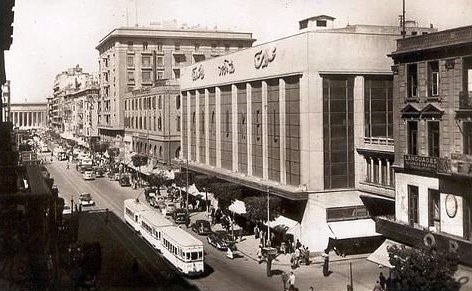
February 15, 1975
Former Egyptian Olympic fencer and leader of the Cairo Jewish community, Salvator Cicurel passes away. A Sephardi Jew, Cicurel’s father Moreno had immigrated from Smyrna (Izmir) in Turkey to Cairo (both were part of the Ottoman Empire at the time) in 1870, where he began working in a Jewish owned textile shop in the city’s main commercial district. In 1909, Moreno Cicurel would open Au Petit Bazar, a department store in the European district of Cairo. The store would change its name to Les Grands Magasins Cicurel et Oreco and grow into one of the largest department store chains in Egypt. The flagship store, “encompassed two buildings, each taking up a city block and looming four stories high … Once inside, shoppers could view an array of goods in departments that supplied the king of Egypt as well as other elite and more middle class families.” (Reynolds, Nancy, A City Consumed: Urban Commerce, the Cairo Fire and Politics of Decolonization in Egypt, Stanford, CA: Stanford University Press, 2012, p. 57)
Moreno Cicurel’s three sons, Solomon, Yusuf and Salvator, assumed control of the business in 1919 and expanded it into a retail empire, adding a series of discount thrift shops. Solomon would be killed in a robbery in 1927 and Yusuf would die in 1939, leaving Salvator in charge of the family business.
Salvator was educated in Switzerland and became Egypt’s national fencing champion and captain of the Egyptian Olympic fencing team in 1928, as well as being an elite golfer. In addition to his many affiliations in sports and Egyptian commerce, he also served as a leader of the Jewish community in Cairo, serving on the Cairo Sephardi Jewish Community Council and becoming its president in 1946. Since the Cicurel store was a preferred shopping destination of the royal family, it was not placed under government administration during the 1948 War as many other Jewish owned businesses were. Even after the military coup that ousted King Farouk in July 1952, the Cicurel store continued to enjoy a level of protection because of Salvator’s connections with members of the Free Officers as a result of his athletic prowess and accomplishments. The Free Officers even helped Cicurel rebuild his store after the Cairo Fire of January 1952.
While serving as president of the Jewish community, there is little to suggest that Salvator himself was a political Zionist. Like many other well off Egyptian Jews, he did little to bring about unnecessary attention to himself or other members of the community and risk the positions they had obtained in Egyptian society.
Salvator Cicurel’s situation, as well as that of most Egyptian Jews changed in 1956 during the Suez Crisis and war. This time, the store, as well as all Jewish businesses, was placed under governmental control. After the war, Cicurel was forced to sell his interests to Muslim Egyptians. The store would be nationalized in 1961. Salvator Cicurel would leave Egypt for good in 1957, immigrating to France. His story is common to that of other Egyptian Jews, especially among the economic elite, who remained in Egypt after 1948, only to leave after things worsened for them in 1956. Most of those who would leave Egypt at that time went to either America or to Europe and not to Israel. The photo shows the store as it looked in the 1940’s.
